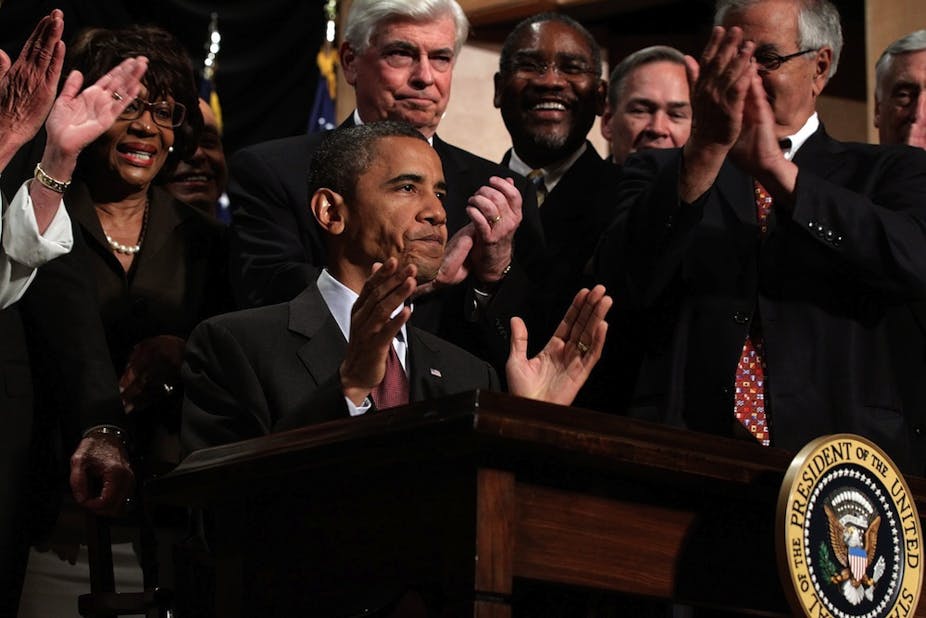This week, the powerful American Petroleum Institute (API), along with a coalition of trade organisations, won a significant battle against increased corporate transparency.
In a lawsuit lodged against the US Securities and Exchange Commission (SEC), the API claimed that the Commission’s interpretation of transparency provisions known as section 1504 in the Dodd-Frank Wall Street and Consumer Protection Act, were unconstitutional.
The industry lobby group successfully argued that the rules would lead to “excessive compliance costs” and cause “irreparable harm” to contract negotiations and competitiveness for oil, gas and mining companies covered by the legislation. It also claimed that the Commission had failed to conduct an adequate cost-benefit analysis in issuing its rules.
The Dodd-Frank Act, passed by Congress in July 2010, was supposed to promote the stability of the US financial system following the global financial crisis.
However, in an interesting use of the legislation, section 1504 was slipped into the back of the Act, in a bid to foster transparency about extractive activities in foreign countries.
Increased transparency, it was hoped, would lead to a reversal of the “resource curse”, which sees resource-rich countries remain underdeveloped as a result of misuse of mineral wealth.
Deadlines and lobbying
The Act stipulated that the SEC pass final rules relating to section 1504 within 270 days. In August 2012, 450 days past the deadline, the rules were finally released, amid threats of legal action from extractive industries constituents and impassioned pleas from transparency and human rights activists.
The SEC’s rules require a resource extraction issuer to provide, in an annual report, information about the type and total of payments made for each project related to the commercial development of oil, natural gas, or minerals, and the type and total amount of payments made to each foreign government to which the project relates.
But the rules provoked intense lobbying effort from both sides. While transparency campaigners urged the SEC to draft the strongest possible rules, the industry lobby argued that the proposed rules were anti-competitive and would create detrimental consequences for investors. In a comment letter, the American Petroleum Institute (API) reminded the SEC of their “overall mission to serve and protect investors” and argued that voluntary regimes, such as the Extractive Industries Transparency Initiative (EITI), already exist to promote payments transparency.
The API’s strong support for the EITI rules was echoed in the comment letters of other key industry players such as Royal Dutch Shell plc and the National Mining Association. Industry support for the EITI is perhaps unsurprising when considering that the voluntary disclosure regime relies on the formation of “multi-stakeholder groups” that “work together” to come up with a country-specific set of disclosure rules.
Group think
Crucial to this process is a joint agreement among group members, no doubt the result of intense negotiations and compromise. The level of disclosure agreed upon typically results in highly aggregated reports and the benefits for implementing countries have been difficult to quantify. Transparency groups such as Oxfam America and Publish What You Pay have criticised extractive industries companies for using their EITI memberships as a PR tool and as a shield against mandatory regulation.
Within weeks of the release of the SEC’s rules, the API, along the US Chamber of Commerce, the Independent Petroleum Association of America, and the National Foreign Trade Council, launched the lawsuit against the SEC. The lawsuit has added fuel to claims of industry hypocrisy, with critics noting that many companies wearing the EITI badge for transparency at the same time as they actively lobby against section 1504 and the SEC rules.
While Judge Bates’ ruling is a blow for transparency campaigners and human rights activists, disclosure regulation is required by the Dodd-Frank legislation and the SEC will be forced to rewrite the rule. Advocacy groups are also considering avenues for appeal and also note the possibility that the rules will simply be re-enacted in the same form but with stronger justification.
Softened impact
It is likely, however, that the SEC will “soften” the impact of the Dodd-Frank requirement in its revised rules. Co-sponsor of section 1504, former Senator Richard Lugar, has said that he would be satisfied with a rewritten rule that requires more broadly compiled payment information, so long as that information was made public.
While the API has claimed the ruling as a major victory for industry and the economy, as the global push for transparency gathers steam, deep pockets will be required if it intends to continue fight against the impending transparency curse. In any case, the API’s fighting spirit is well-supported: with revenues of more than US$200 million at its disposal, and member companies including ExxonMobil, Chevron, Shell, and BP, the API promises to be a formidable opponent.

